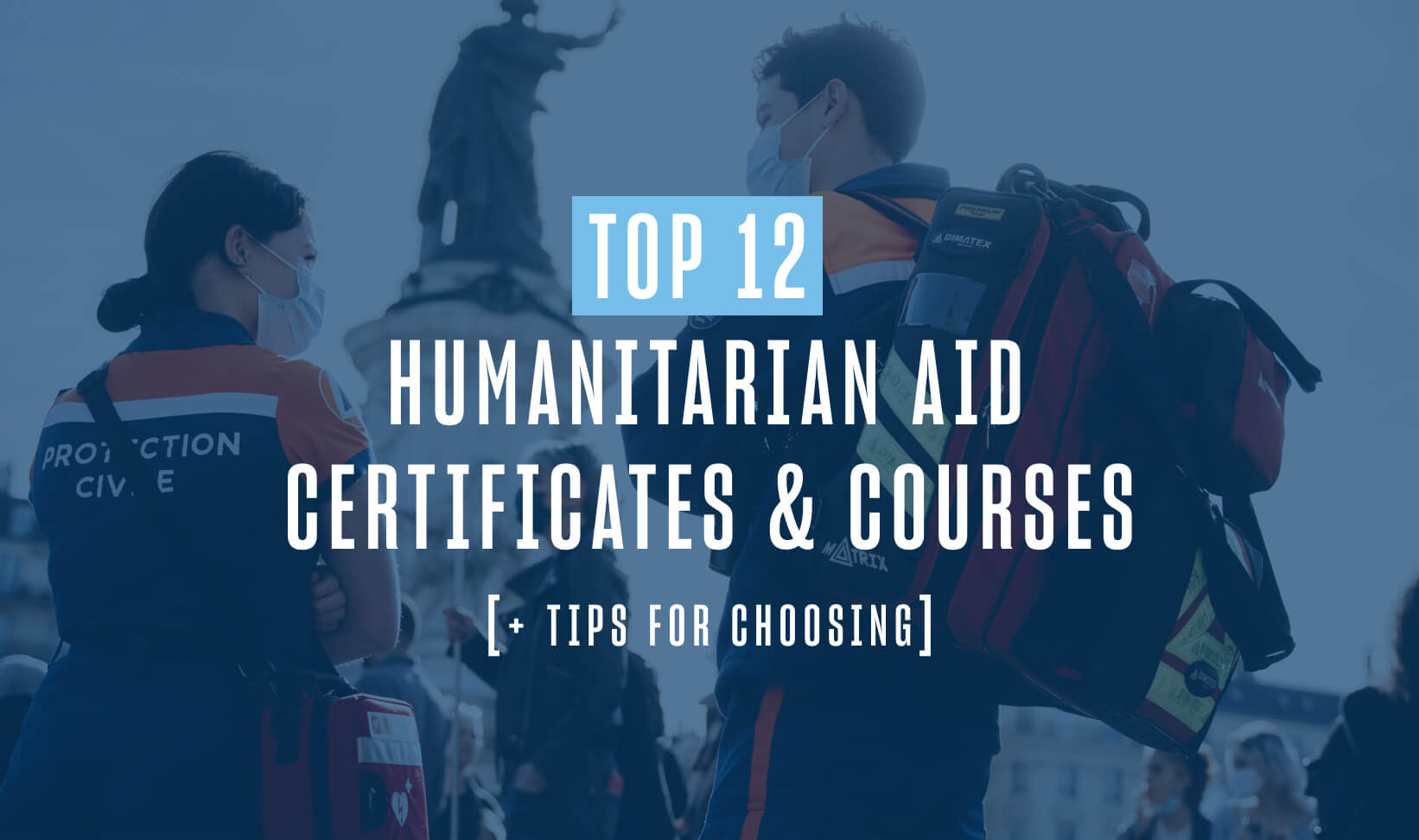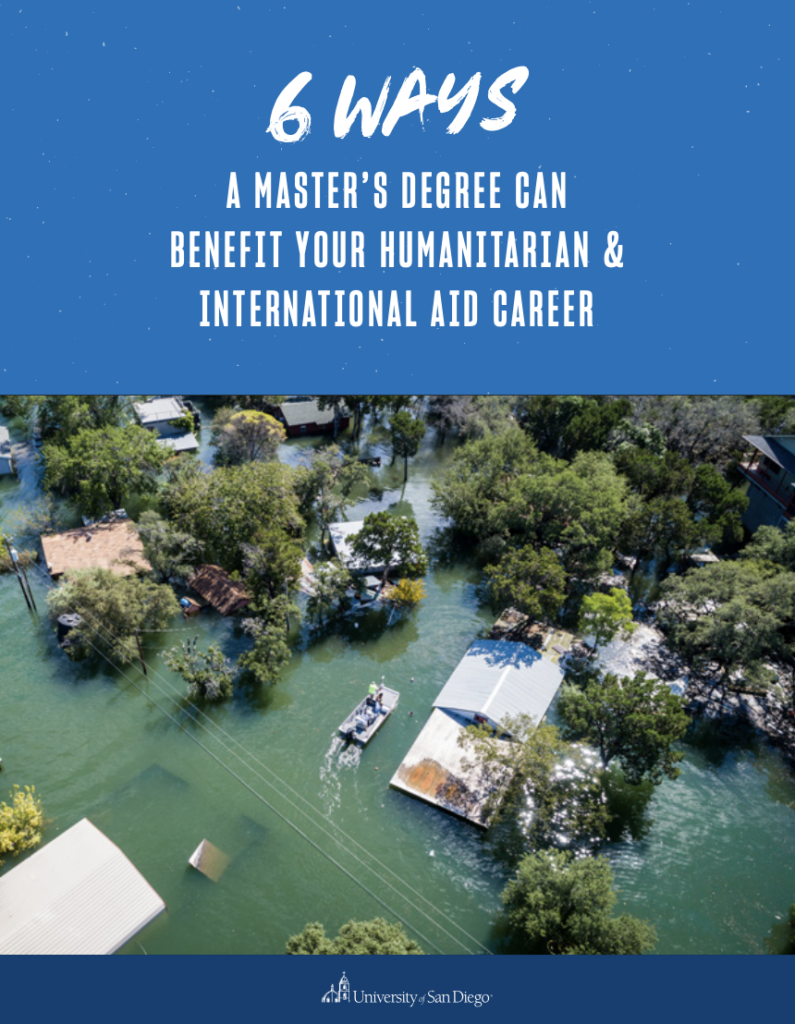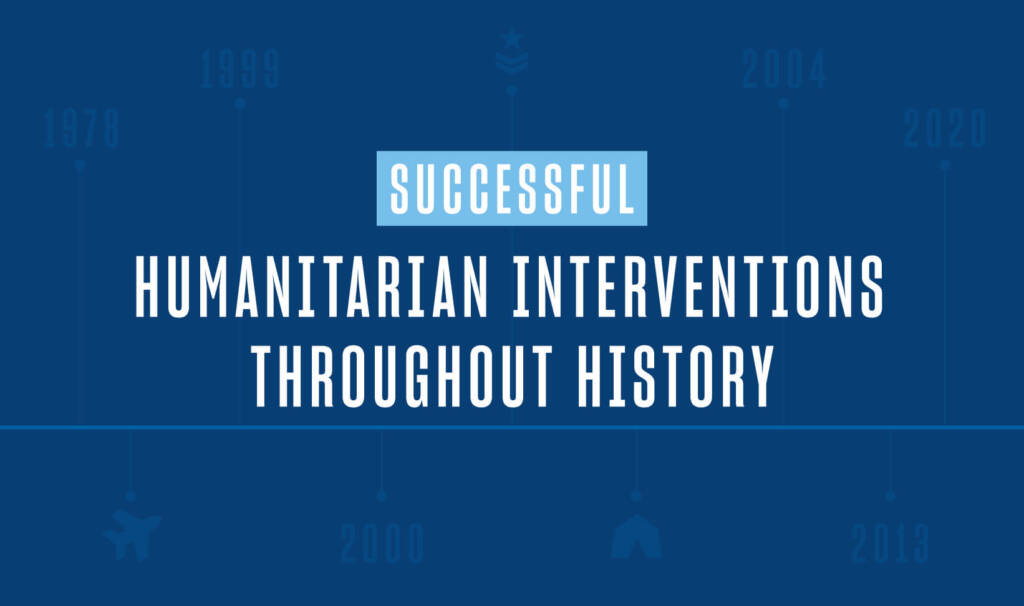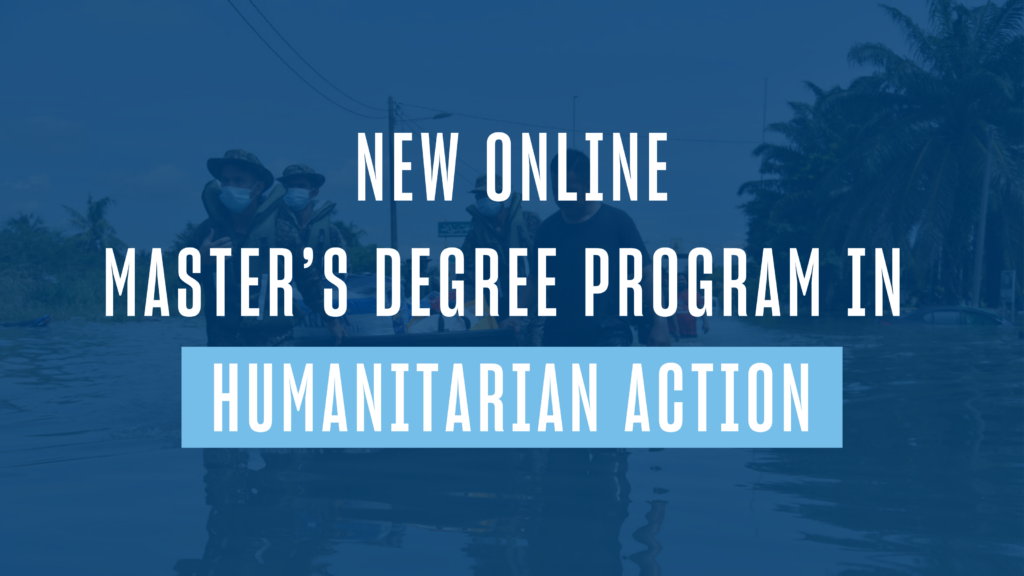Certifications and courses are educational tools that can provide a host of benefits, including additional knowledge and specialized skills that can help advance your career. These are especially important in humanitarian work, but with so many options available, how can you determine which ones are right for your goals and interests?
What Are Humanitarian Aid Certifications?
Let’s first explore the similarities and differences between certifications and certificates.
- A certification is a credential that verifies your knowledge and competence in a specific skill set or subject area. In most cases, you will need to pass an exam or a certain type of assessment, often administered by a third party. Most certification exams require extensive preparation.
- A certificate is a document or other form of verification that is issued to show the completion of a course or program.
Humanitarian aid certifications are intended to enhance your humanitarian knowledge and skillset so that you are adequately prepared for a job in relief work. Certifications may cover general topics or offer specializations.
Reasons to Pursue Humanitarian Aid Certifications
In addition to career preparation, humanitarian aid certifications can enhance your soft skills and allow you to connect with other like-minded professionals. Certifications also show potential employers that you are serious about your career and furthering your humanitarian education, which can set you apart from other job applicants.
The humanitarian field is constantly evolving, which means it’s important to stay on top of best practices and trends. Additional education such as certifications and master’s degree programs can offer that type of valuable guidance and preparation.
[RELATED] 15 Important Crisis & Global Trends: What You Need to Know
Careers That Would Benefit from a Humanitarian Aid Certification
Certifications will benefit all types of humanitarian careers, though some programs and courses are more helpful than others, depending on the type of position you either have or are interested in obtaining. The following types of humanitarian careers would all benefit from the additional education that certification programs can provide:
- Relief and response
- Advocacy
- Leadership/management
- Fundraising
- Communication/outreach
Some certification programs or courses are designed for specific roles. For example, those who work in humanitarian fundraising (or are interested in that particular area) may find the Certified Fund Raising Executive certification helpful.
While certifications are beneficial for senior-level, management and director roles, these types of positions typically require a master’s degree.
[FREE EBOOK] Discover the 6 Ways a Master’s Degree Can Benefit Your Humanitarian and International Aid Career
12 Humanitarian Aid Certifications & Courses
The following certifications and courses are listed in alphabetical order and are not ranked in any particular way.
Certified Fund Raising Executive (CFRE)
Details: The CFRE exam assesses knowledge of ethical fundraising. This computer-based exam consists of 200 multiple-choice questions. You have the option of visiting an in-person test center or taking the exam from your home or office via online remote proctoring.
Intended participants: This certification is geared toward anyone currently involved (or interested in) philanthropy and fundraising.
Curriculum: Exam topics include current and prospective donor research; securing the gift; relationship building; volunteer involvement; leadership and management; and ethics, accountability and professionalism.
Time commitment: You should plan to study for at least 40–80 hours. The exam itself is 4 hours.
Cost: The standard fee is $875 for initial certification and $375 to retake the exam. Recertification is $510. Members of participating organizations are eligible for a discounted fee — $700 for initial certification and $408 for recertification.
Red Cross Certified Nurse Assistant
Details: Approximately 5,000 students take this training each year, which is taught by credentialed instructors with professional nursing experience.
Intended participants: This program is ideal for college nursing students and physician assistants.
Curriculum: This program consists of theory and skills practice, a clinical experience at a nursing facility and topics such as critical thinking, decision-making and team concepts.
Time commitment: You can expect to complete your training and be ready to take your state certification exam to become a licensed or certified nurse assistant within 4–8 weeks of beginning this training. This training is offered year-round and features night and weekend classes to accommodate your schedule.
Cost: Providers set the cost; check specific class listings for more information.
Campus Compact Community Engagement Professional
Details: This certification covers a range of areas and skill sets that are crucial to “success in higher education civic and community engagement.” Interested applicants must fill out an online application; submission requirements vary by core competency.
Intended participants: This certification is ideal for community leaders, young professionals who are looking to build their resumes and expand their skill sets and established professionals in community-based careers.
Curriculum: For full certification, students must combine five credentials in different competency areas (three essential credentials and two elective credentials). The three essential credentials are Community Engagement, Community Partnership and Equity & Inclusion.
Time commitment: Contact Campus Connect for more information.
Cost: Each core competency credential application requires a $60 application fee.
Core Humanitarian Certification
Details: This free certification is courtesy of DisasterReady, an online learning platform that provides self-paced resources and materials available in multiple languages.
Intended participants: This certification is aimed at people who have little-to-no humanitarian experience or professionals who want recognition for their core humanitarian knowledge and skills.
Curriculum: Topics include humanitarian basics; international legal framework for humanitarian practice; funding and financing humanitarian aid; grant proposal development; information, data and technology in the humanitarian sector and professionalism in humanitarian work.
Time commitment: The certification is self-paced.
Cost: Free
Foundations of Global Health Specialization
Details: This specialization from Coursera and Johns Hopkins University teaches humanitarian program planning, implementation and evaluation.
Intended participants: This specialization is ideal for professionals who currently work in (or would like to work in) global health programming.
Curriculum: Course topics include Understanding and Strengthening Health Systems, Public Health in Humanitarian Crises, Health for All Through Primary Care, Diagnosing Health Behaviors for Global Health Programs, Community Change in Public Health and Training and Learning Programs for Volunteer Community Health Workers.
Time commitment: Students typically complete the specialization within 6 months, but the program is also self-paced.
Cost: You can audit the specialization for free, but you must enroll to earn the certificate. Coursera Plus offers unlimited access to more than 7,000 courses and certification programs for a monthly subscription of $59 (or $399/year).
Graduate Certificate in International Humanitarian Response
Details: The goal of this certificate, which is offered through the University of Washington Graduate School, is to “provide graduate and professional students from a variety of disciplines with a coherent body of study to gain a better understanding of prevention, mitigation, response, and recovery for crises to ultimately assist those affected by disasters (or living in a disaster-prone area) to recover their ‘normal’ way of life.” Five students are accepted into the certificate program each year.
Intended participants: Information about the application process can be found online.
Curriculum: Courses include Economics of International Development, Community Resilience and Health in Complex Humanitarian Emergencies. Participants will also complete a capstone project and must take a certain number of elective courses to reach the minimum of 15 required credits.
Time commitment: This program takes approximately two years to complete.
Cost: Contact University of Washington for pricing.
Details: According to the website, this program from the International Association of Professionals in Humanitarian Assistance and Protection (PHAP) provides “an opportunity for humanitarian practitioners in all parts of the sector to demonstrate their professional competencies and dedication to their work.”
Intended participants: Current and aspiring humanitarian practitioners.
Curriculum: Candidates prepare for the certification in a way that works best for them; no specific courses are required. PHAP does provide an assortment of free tools and resources.
Time commitment: Students must pass a multiple-choice assessment that they can take 24/7 through a computer with a stable internet connection and webcam.
Cost: $80 for non-PHAP members; $65 for PHAP members.
Humanitarian U professional development courses
Details: Humanitarian U offers a variety of valuable courses, hands-on training sessions and a certification program.
Intended participants: Current and aspiring global humanitarian aid workers.
Curriculum: Courses include Free Guide to Working in an Ebola Treatment Unit, Refugee Health, Disaster Management and Emergency Planning and COVID-19, among many others. Humanitarian U has also partnered with DisasterReady to offer the free online Core Humanitarian Certification.
Time commitment: Varies by course
Cost: Free
Public Health in Humanitarian Crises 1 & 2
Details: Offered by Johns Hopkins University through Coursera, the Public Health in Humanitarian Crises 1 and Public Health in Humanitarian Crises 2 courses are designed to provide a foundation for public health knowledge. No previous experience is necessary.
Intended participants: Current or aspiring humanitarians.
Curriculum: Module topics for the first course include Humanitarian Disasters and Public Health, Water and Sanitation, Nutrition in Humanitarian Crises and Health Care in Humanitarian Emergencies. The second course covers Disease Outbreak Management, Maternal and Newborn Health, Humanitarian Principles, and more.
Time commitment: Each course takes approximately 12–16 hours to complete, but the schedule is flexible and self-paced.
Cost: You can audit for free, but you must enroll to earn the certificate. Coursera Plus offers unlimited access to more than 7,000 courses and certification programs for a monthly subscription of $59 (or $399/year).
Operational Research for Humanitarians
Details: Though this is a beginner-level course, some humanitarian experience is recommended. The assessment constitutes a total of 32 quizzes.
Intended participants: Current or aspiring humanitarian professionals who are interested in research.
Curriculum: Module topics include Ethics and Community Engagement, Conducting Research in Humanitarian Settings and Research Questions and Study Designs.
Time commitment: Thiscourse takes approximately 16 hours to complete, but the schedule is flexible and self-paced.
Cost: You can audit for free, but you must enroll to earn the certificate. Coursera Plus offers unlimited access to more than 7,000 courses and certification programs for a monthly subscription of $59 (or $399/year).
Public Sector HR Association certifications
Details: The Public Sector HR Association (PSHRA) is an organization dedicated to providing public sector human resources professionals with proper education and experience.
Intended participants: PSHRA offers two certifications:The IPMA-CP is intended for entry-level and mid-level public sector human resources professionals. The IPMA-SCP is geared toward senior-level, public sector HR professionals.
Curriculum: Topics include job classification and compensation, labor and employee relations and more.
Time commitment: The certifications are offered in flexible, online, self-paced formats. Each module takes approximately 2–4 weeks to complete.
Cost: IPMA-CP is $999 for members and $1,299 for non-members. Contact PSHRA for IPMA-SCP pricing.
First Aid & CPR: An In-Depth Guide to CPR, AED and Choking
Details: This beginner-friendly course is designed to teach all the necessary basics of first aid and CPR with no previous experience needed.
Intended participants: Anyone
Curriculum: Students will learn the basics of first aid and how to perform CPR according to the latest guidelines, use an automated external defibrillator, save a baby from choking and perform the Heimlich maneuver.
Time commitment: The course includes 2 hours of on-demand video, one article, 14 downloadable resources and full lifetime access to all resources.
Cost: $84.99
If you’re considering a master’s degree to supplement any humanitarian certificates or courses, please visit our program page to learn about the 100% online Master of Science in Humanitarian Action (MSHA). This degree program will cultivate the skills and knowledge needed to help prevent, respond to and recover from complex global humanitarian emergencies.




